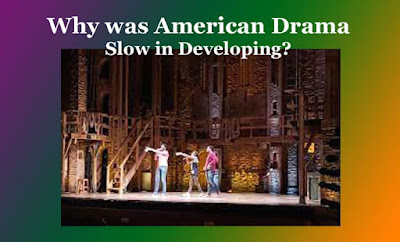Why was American Drama Slow in Developing?
Why was American Drama Slow in Developing?
Why was American Drama Slow in Developing?
Introduction:
The development of American drama was initially slow due to several historical, cultural, and social factors. Unlike Europe, where theatre had a long and established tradition, the American colonies faced challenges that hindered the growth of a robust dramatic tradition. Below are some key reasons why American drama took time to develop:
Why was American Drama Slow in Developing - Key Reasons:
Puritan Influence:
The early colonial period was heavily influenced by Puritan beliefs. Puritans viewed theatre as sinful and frivolous, associating it with immoral behavior. The strict moral and religious codes prevalent in the colonies discouraged the development of a thriving theatrical culture.
Colonial Challenges:
The early American colonies were focused on survival and faced numerous challenges, including harsh living conditions, conflicts with Native Americans, and the struggle for economic stability. These challenges left little room for the leisure and cultural pursuits that might foster the growth of a theatrical tradition.
Lack of Professional Actors:
In the early years, the American colonies lacked a professional class of actors and playwrights. The few performances that did occur were often amateur productions or touring shows featuring imported British actors. The absence of a homegrown talent pool hindered the development of a distinct American theatrical voice.
Censorship and Regulation:
Even as theatre started to emerge in major cities like New York and Philadelphia in the 18th century, it faced censorship and strict regulations. Authorities were often concerned about the potential for moral decay and disorder associated with theatrical performances, leading to limitations on content and licensing.
British Dominance:
The American colonies were under British rule, and cultural influence from the mother country was dominant. British theatrical traditions, including the works of William Shakespeare and Restoration comedy, held sway, making it challenging for a uniquely American dramatic voice to emerge.
Revolutionary War and Nation-Building:
The Revolutionary War and the subsequent period of nation-building demanded attention and resources. The focus was on establishing political structures, creating a constitution, and addressing issues related to independence. Cultural pursuits, including the development of a national theatre, took a back seat during this foundational period.
Economic Factors:
Economic considerations also played a role in the slow development of American drama. Theatres required financial investment, and in a society focused on economic stability and expansion, cultural endeavors often struggled to secure the necessary funding.
Westward Expansion:
As the country expanded westward, settlers faced the challenges of frontier life. Theaters were not a priority in these new settlements, and the development of a cultural infrastructure took a backseat to more immediate concerns.
Industrialization and Urbanization:
It wasn't until the 19th century, with the rise of industrialization and urbanization, that American cities began to develop the cultural amenities necessary for a thriving theatrical scene. The growth of cities allowed for larger audiences and a more stable economic foundation for theatrical productions.
Shifts in Cultural Attitudes:
Over time, cultural attitudes toward theatre evolved. As the nation matured and became more diverse, there was a gradual acceptance of theatre as a legitimate form of artistic expression. This shift in attitude laid the groundwork for the eventual development of a rich and varied American dramatic tradition.
Conclusion:
Despite these initial challenges, American drama eventually found its footing, with the emergence of influential playwrights like Eugene O'Neill in the early 20th century and the establishment of renowned institutions such as the Group Theatre and the Federal Theatre Project during the Great Depression. These developments marked the beginning of a vibrant and distinctive American theatrical tradition that continues to thrive today. 0 0 0. Why was American Drama Slow in Developing?
You May Like:
.










Comments
Post a Comment